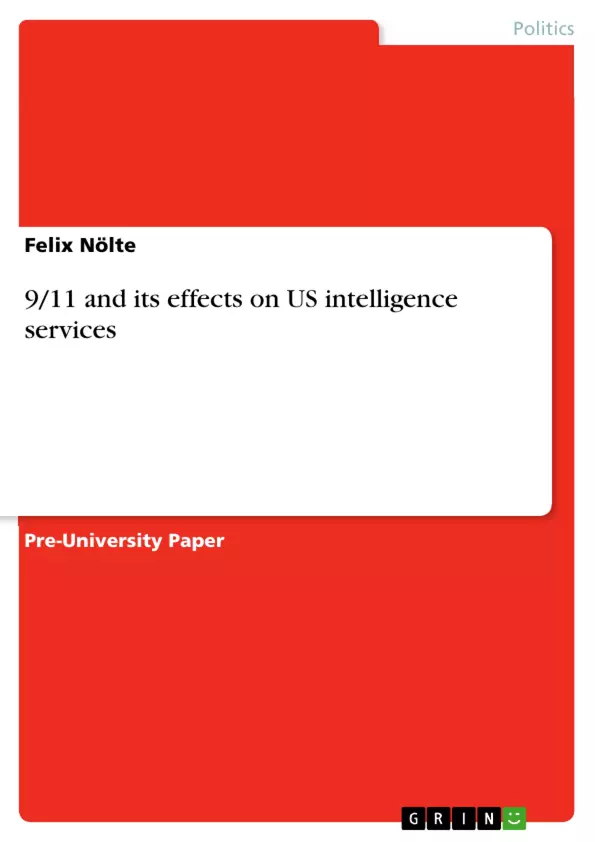September 11, 2001 represents the unpreparedness of the Government of the United States against terrorism on domestic territory. Four planes from domestic flights were hijacked by foreigners and used to kill thousands of citizens in the United States. The immense loss made people call for actions taken to defend the emerged danger with new strategies against terrorism respecting circumstances that led to the attacks.
This research paper shows the effect of 9/11 on US intelligence services. Therefore there will be given an overview of intelligence services in the US, a short summary of the attacks and a detailed presentation of two essential laws made in response to the events.
Spying is the world's second oldest profession, a saying goes. No matter what era, humans have always relied on information about rivals. The challenge of spying is to gain that information as it is usually covert by the enemy.
In war, as known till the end of the 20th century, those enemies were usually identifiable as such by common characteristics like their culture, opinions or from previous conflicts. Governments therefore did not concentrate on finding new dangers, but on defending those already known. If enemies manage not to get attention, there is a chance the government is unprepared and doesn't fight them, so their attacks can have a bigger impact.
The immense acceleration of communication in the last century along with globalization and its increased mobility for people all over the world, helps enemies to use that weak point for their purposes. They can spread and connect all over the world to avoid identification, but most drastic, threats can be performed right at the target by only few members without getting attention. Terrorism, previously seen as an affair between nations, became a domestic issue.
Inhaltsverzeichnis (Table of Contents)
- Introduction
- Intelligence
- Intelligence services in the U.S.
- History of intelligence in the United States
- FBI
- CIA
- NSA
- FISA
- Intelligence-making
- Intelligence services in the U.S.
- 9/11
- Intelligence services after 9/11
- Patriot Act
- Content
- Enhancing Domestic Security Against Terrorism
- Enhanced Surveillance Procedures
- International Money Laundering And Anti-Terrorist Financing Act of 2001
- Protecting the Border
- Improved Intelligence
- Effects and Reactions
- Content
- Homeland Security Act
- Department of Homeland Security Act
- Border and Transportation Security Division
- Emergency Preparedness and Response Division
- Science and Technology Division
- Information Analysis and Infrastructure Protection
- Effects and reactions
- Department of Homeland Security Act
- Patriot Act
- Conclusion
Zielsetzung und Themenschwerpunkte (Objectives and Key Themes)
This research paper aims to examine the impact of the 9/11 terrorist attacks on U.S. intelligence services. It provides an overview of intelligence services in the United States, summarizes the 9/11 attacks, and analyzes two key laws passed in response to the events. The paper explores the role of intelligence in the context of global security, highlighting the need for ongoing adaptation in the face of evolving threats.- The history and structure of U.S. intelligence agencies.
- The challenges posed by terrorism and the evolving nature of threats in the post-9/11 era.
- The impact of 9/11 on the U.S. intelligence community and its response mechanisms.
- The Patriot Act and Homeland Security Act as major legislative responses to the 9/11 attacks.
- The ongoing debate surrounding the balance between security and civil liberties in the context of counterterrorism efforts.
Zusammenfassung der Kapitel (Chapter Summaries)
The Introduction sets the stage for the research paper by discussing the historical importance of intelligence gathering and the challenges posed by the evolving nature of threats. It emphasizes the significance of 9/11 as a catalyst for significant changes in U.S. intelligence practices. Chapter 2 delves into the concept of intelligence itself, exploring its definition and importance for decision-making in national security. It examines the structure and history of intelligence services in the United States, highlighting the key institutions and their roles. Chapter 3 provides a brief summary of the 9/11 attacks, emphasizing their devastating impact and the need for a comprehensive response. Chapter 4 analyzes two major legislative responses to 9/11: the Patriot Act and the Homeland Security Act. The chapter discusses the content and implications of these laws, exploring their intended goals and their impact on intelligence gathering, surveillance, and domestic security.Schlüsselwörter (Keywords)
The main keywords and focus topics of this research paper include: U.S. intelligence services, 9/11, terrorism, counterterrorism, Patriot Act, Homeland Security Act, surveillance, security, civil liberties, intelligence gathering, information analysis, national security, globalization, and the evolution of threats.Frequently Asked Questions
How did 9/11 affect U.S. intelligence services?
The attacks exposed a lack of preparedness and led to massive structural changes, increased surveillance powers, and the creation of the Department of Homeland Security.
What is the Patriot Act?
Passed in 2001, it expanded the government's authority to conduct surveillance, monitor financial transactions, and share intelligence to prevent future terrorist attacks.
What are the main U.S. intelligence agencies mentioned?
The research highlights the roles of the FBI (domestic), CIA (foreign), and NSA (signals intelligence).
What is the Homeland Security Act?
It is a 2002 law that established the Department of Homeland Security (DHS) to unify various agencies responsible for border security, emergency response, and infrastructure protection.
How has the nature of the "enemy" changed post-9/11?
Terrorism shifted from a conflict between nations to a domestic issue involving non-state actors who use globalization and modern communication to avoid identification.
- Quote paper
- Felix Nölte (Author), 2013, 9/11 and its effects on US intelligence services, Munich, GRIN Verlag, https://www.grin.com/document/311184



